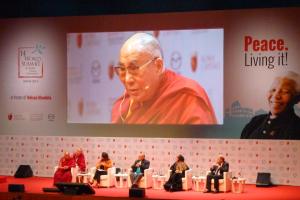In the second session of the Summit, “Living in Peace for human development – the threats to sustainable human development”, at the end took the stage His Holiness the Dalai Lama accompanied by a standing ovation from the entire room.
Without losing his subtle sense of humour, he explained that peace is more than the mere absence of war. Peace and Nonviolence have to do with compassion and respect for others. With his smile and sympathy he spoke of the importance of not always placing oneself at the centre of the world because the “I” comes before anything, against the humanist nature of human beings.
The basis of everything is the concern for others, respect for the lives of others, love, compassion and nonviolence.
Compassion in particular is the feeling that drives children to help each other. We must start again from there. His Holiness also strongly emphasised the value of education as the key to a world in peace. “Although it may seem idealistic or unrealistic” the Dalai Lama said “there is no other way to reach peace. It is unthinkable to believe we can solve violence with violence,” he said, stressing the importance of a more active role for women to promote love and compassion.
Tawakkol Karman’s speech followed the Dalai Lama. Tawakkol was not only the first Yemenite, the first Arab woman and second Muslim woman to win a Nobel Peace Prize in 2011, but also the youngest to receive this award for the 32 years before Malala. It was in recognition for her commitment to nonviolent struggle for human rights and the rights of women and her dedication to building peace pathways in Yemen. In her impassioned speech at the summit, Tawakkol spoke of the meaning of peace. Peace means ending injustice, dictatorship and listening to the voices of all those fighting for democracy and respect for human rights. Peace means granting the right to speak to organisations and take the side of all those who fight for their freedom and their rights. “To end violence we must listen to all the people who are at the forefront of the struggle for freedom, answer their requests, help those who work for justice and equality.” This applies to all; equality between men and women is fundamental. The appalling violence, such as that now raging in Syria must stop now, before wars erupt, people die and millions of people become refugees.
The Nobel Jose Ramos-Horta, Peace Prize 1996 took the floor after Karman to explain the need to fight for one’s own rights, but not devalue others or oneself. The biggest mistake made in Syria has been this. We have to get away from all kinds of fanaticism, said Ramos-Horta.
The first day concluded with the bestowing of the Social Activism Medal to Morten Hovda in representation of the International Workers Organization (IWO), Nobel Peace Prize 1969). Hovda explains how inequalities, especially income, are the cause that most hinders development. Also called the young to consider education as the basis of everything and increase pressure on governments to achieve peace and rights.
The Liberian activist Leymah Gbowee finally gave the Medal for Social Activism to Tareke Brhane, Eritrean activist who, after crossing the Mediterranean, is devoting his life to those who, with so many difficulties, are trying in the same way to reach Italy and Europe. With a fiery speech, he dedicated the award to all the victims of the Mediterranean. Brahne ended the day with a call to “protect the people, not the borders.”






